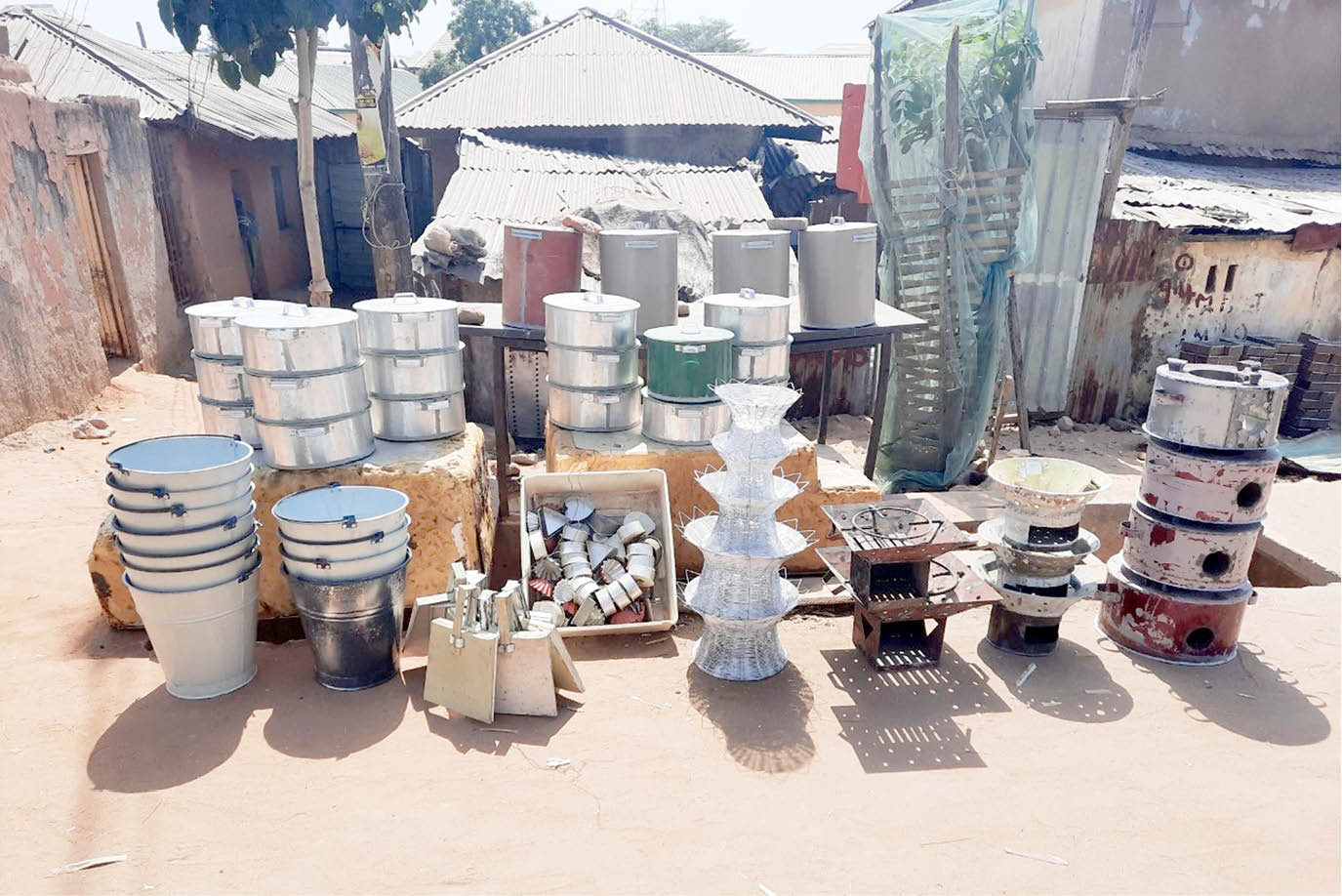Daily Trust visited a 102-year-old silversmith industry, locally known as Makeran Farfaru, at the heart of Gombe metropolis, established in 1919 alongside the Gombe town itself.
The Gombe Makeran Farfaru located few metres south of the Gombe Emir’s Palace, was established in 1919 during the reign of Emir Umaru Kwairanga (1898 – 1922), the seventh Emir of Gombe.
- Queen Elizabeth’s Husband Dies At 99
- Police affairs minister: Buhari serious about ending insecurity but Nigerians must sit up
According to oral accounts, the silversmiths relocated to the present location in Dawaki quarters of Gombe Local Government Area, when the Gombe Emirate headquarters was transferred from Nafada town to Gombe in 1919.
The word ‘Makera’ is a Hausa name for smithy; the area is known for its silversmith activities, which happened to be the main occupation of people of the area, which therefore became known as Makera.

It was situated within residential areas with few makeshift stalls serving as workshops, especially for the yan tinka. While the silversmith uses the entrance (Zaure) of their respective houses as workshops, where a forge hearth used for heating silver to fabricate things is located.
There are two smithy markets in Gombe, the silversmith (Farfaru) and blacksmith (Babbaku).
The silversmiths, popularly called Makeran Farfaru, fabricate ear rings, bangles, necklaces and rings for women as well as horse decorating items like the quilted armour (Sulke), stirrups and the zinc helmet (Kwalkwali).
The blacksmiths (Makeran Babbaku) on the other hand use iron ore to manufacture swords, spears, knives, hoes, chains, handcuffs, locks, axes, sickles and so on.
The silver (Azurfa) materials used in Makeran Farfaru are sourced and mined locally while the other raw materials are recycled used cans of cooking oil and aluminum roofing sheets.
There are two types of silversmiths in the market; those that fabricate items like the ear rings and other horse-decorating items; and the yan tinka who mostly use recycled cans and roofing sheet to fabricate items.
The yan tinka fabricate boxes, and other items used for domestic use like cooking pots, buckets, keys and most recently tools used by bakeries to produce bread, cake and other snacks.
When our correspondent visited the smithy, the market was beehive of activities with young and old silversmiths busy with their working tools attending to their respective customers.
Speaking to Daily Trust, the oldest silversmith in the market, Malam Hashimu Haladu, 78, said in the past, customers from all over Northern Nigeria patronised the market due to the high quality of the items produced in the market, which according to him cannot be matched anywhere in the country.
He narrated how he grew up among silversmiths who were lodged at the residence of

their neighbour and his guardian, late Saraki Malam Jatau, the first leader of the Gombe smithy.
“I was born 78 years ago near the smithy. My father’s house was adjoining that of the first silversmith that lived near the area, late Saraki Malam Jatau. I grew up seeing over 28 blacksmiths who relocated to Gombe with the late Jatau, who were all housed near the market. So I seamlessly learnt the trade living near the market and being a friend to the son of the head of the silversmiths.
“In the golden days of silversmiths at the smithy, we were fabricating almost everything, like the rings, ear rings bangles and other horse-decorating items with buyers from all neighbouring towns, villages and beyond,” he said.
Malam Haladu who specialises in fabricating car and house keys, said he had single-handedly trained and mentored people that arguably trained all the present silversmiths fabricating keys in the whole of Gombe State today.
The oldest silversmith also narrated how ‘tinka’ was introduced into the market between 1950s and 1960s.
He said: “Tinka was introduced into Gombe Smithy by Alhaji Bello Tinka, who returned to Gombe town from Borno State because of the NEPU activities. Alhaji Bello learnt the trade from Kaduna and Lagos.
“He was the one that introduced ‘tinka’ in Gombe and today, due to the modernisation, the ‘tinka’ has become the main stay of Gombe smithy, where bakeries from all over the country come to buy materials for baking bread and other snacks.”
Despite his advanced age, Haladu said he still works in the smithy assisting the young silversmiths, especially when they get difficult work to do.
He is married to four wives with 15 living children for whom he caters from the silversmith occupation.
Usman Abdullahi Saraki, 57, the present Sarkin Kasuwa, told Daily Trust how the smithy came into being and how they cope with modernisation taking over most of their businesses.
He said the first leader of the silversmiths was his grandfather, Saraki Malam Jatau who came from Nafada in the entourage of Emir Umaru, after the British colonialists ordered the transfer of the emirate from Nafada to Gombe.
“My grandfather, Malam Jatau, is the person that founded the smithy in 1919 when headquarters of Gombe emirate was transferred from Nafada to Gombe Doma in 1919. It was the Emir of Gombe, Umar Kwairanga, that requested for a silversmith from the then Emir of Kano.
“The emir asked Emir of Kazaure, who in turn gave him his master silversmith, Malam Jatau. And when the emir moved to Gombe, they came together,” he said.
According to him, modernisation has negatively affected their businesses, as people no longer use the old fashioned materials fabricated in the market, even though some people patronise them for silver.
“Although generality of people no longer use the local items produced here, there are some that still patronise us for silver (Azurfa) rings, earrings, bangles and other items used by women.

“But largely, the smithy is now more of items produced by the ’yan tinka’, which are the main stay of the market. Items used by bakeries and poultry farms have now taken over the market,” Saraki said.
It was gathered that over 1,000 between the ages of seven and 70 now work in the smithy, earning their livelihood.
According to him, both local and modern bakeries across the North East Geo-political zone depend largely on the market for their tools for making bread, cakes and other snacks.
“Poultry farms also patronise us for tools in their respective farms. We are also making other items used for domestic usage like local stoves (Murhu) that use charcoal, which is the vague now as people are gradually leaving fire wood.
“We are also producing overhead stands for water tanks for both domestic and factory use. We were producing iron water tanks but when the modern plastic water tank was introduced, we diversified and now producing the stands,” Saraki added.
Daily Trust gathered that the smithy is a major source of revenue to the host Gombe Local Government Area, where revenue is collected on a monthly basis in the last 40 years.
A customer, Muhammad Sani Hassan, said he was at the smithy to get a silver (Azurfa) ring.
According to him, he still patronises them because he will select the exact design he wants and the silversmith will fabricate the ring to his taste.
A young silversmith, Abdullahi Bello, 27, learnt the trade from his father when he was barely 10 years old.
Bello who studies at the Federal College of Horticulture, Dadin-Kowa, said he is sponsoring his education, owns a plot of land and supports his aged parents from silversmith work.
He said locally made rings cost N3,000 and above, depending on the quality of the rings, adding that on average, he saves about N20,000 monthly apart from his daily upkeep.
Despite the advent of modernity that drives away most of the people who patronise the Gombe’s Makeran Farfaru, silversmith work at the smithy still defies odds and progresses by giving means of livelihood to thousands of people for over 100 years.

 Join Daily Trust WhatsApp Community For Quick Access To News and Happenings Around You.
Join Daily Trust WhatsApp Community For Quick Access To News and Happenings Around You.


